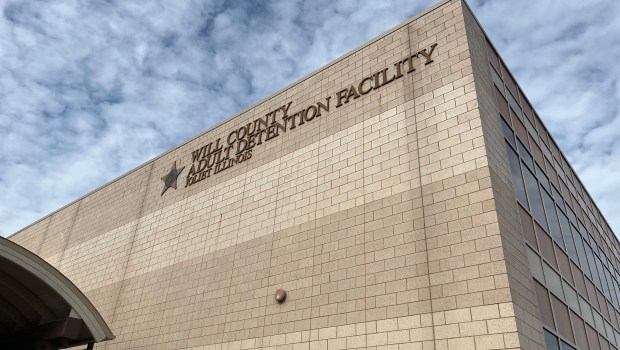For nearly a decade, Sister Sandra Franzen has helped detainees waiting trial at the Will County Adult Detention Facility prepare to take the GED test.
Franzen decided to pursue a teaching career at 50, going back to college to earn her degree. She retired at 65, but wasn’t ready to step away from education.
When she moved to Joliet, she volunteered at the Will County jail with Sister Vivian Whitehead, who founded the nonprofit Will County Center for Correctional Concerns in 1979 to provide GED education and library services for inmates. Franzen also volunteered with an evening program called Aunt Mary’s, where detainees record themselves reading books to send to their children.
Now, Franzen is one of four instructors at the social service agency dedicated to helping detainees prepare for the four-part GED test that can earn them a high school diploma.
“I’m 78 years old and too old for a classroom of little kids, and this way I’m still able to teach,” Franzen said. “And it’s very rewarding.”
However, she said the GED test became more challenging in 2014 after a major overhaul, making it more expensive, computerized and rigorous to better align with each state’s Common Core Standards.
The Will County Center for Correctional Concerns provides the tests to detainees free of charge, according to the nonprofit’s director, Chris Alcorn. However, each test costs the agency $26, or $104 for all four sections, which she said can add up quickly. Alcorn said they expect to pay for about 150 tests this year.
To help offset these costs, the agency is seeking at www.willcountyccc.org or sent to agency’s development department within the detention center at 95 S. Chicago St., Joliet.
“Everything costs more and any way that our agency can get help to keep these programs going is important,” Alcorn said.
The agency began preparing detainees to take the GED about 45 years ago, she said. It all began with Whitehead, who would often visit detainees and learned many did not have a high school diploma.
“She found it was a need,” Alcorn said.
The program has continued to grow. Most of the agency’s instructors have a waitlist for their classes, she said.
“We find that people with high school diplomas get a higher rate of income, they have more family stability and they have better housing,” Alcorn said. “If we want individuals, who have made mistakes and are here in our facility, to not return, giving them the skills they need once they return to society, to the community, is a win.”
Data collected by the U.S. Bureau of Labor Statistics in 2023 show the average full-time or salaried worker over 25 with a high school diploma earned $191 more a week than those without. The agency’s most recent data show those without a high school diploma make an average of roughly $37,500 a year, compared to $47,000 for high school graduates without a college degree.
As the job landscape evolves, more employers now require at least a high school diploma, Alcorn said.
The GED exam is divided into four tests, math, reading, social studies and science. Franzen, who works with detainees at the jail four days a week, said students can take one part of the test each month, but the preparation time varies based on each student’s starting level and progress.
“We give them a pretest to find out their level of reading and math, and then we have books to get them started. So if they score fairly high on the pretest, then we’ll start them at a higher level and then they’ll work at it probably about a month before they take the test,” she said.
A minimum score of 145 out of 200, or a C grade, is required to pass each subtest, Alcorn said.
Franzen described her class as less of a traditional lecture-style setting and more like a tutoring session, where she provides individualized support to students in the subjects they are focusing on.
“I currently have six students, three of them are in reading, one is in social studies and one is in science and one is in math,” Franzen said. “They’re progressing at their own speed.”
For Franzen, the work is meaningful and seeing her students progress is rewarding.
Franzen said she started tutoring a man in his 50s in math a few months ago. He had difficulty with the subject he doubted whether he could figure it out.
He said, “I can’t do this. It’s too hard,” Franzen recalled.
This week, she said he figured out how to solve a math problem on his own.
“A lot of times, when they’re in here they have no self-esteem, no confidence that they can do it,” she said. “They just know they need it, and so I try to encourage them to notice the good things that they’re doing.”
A high school diploma opens doors to higher paying jobs, like union work in welding, carpentry and truck driving, she said. Even with a criminal record, union jobs pay well and convicts can be hired if they have their GED or a high school diploma, she said.
Franzen believes it may be easier to go through high school than to take the GED but environmental and social factors make it difficult for some to stay in school.
“I think a lot of people leave high school because there’s so many other factors, not the educational work that they’re struggling with, but emotional things that are happening at home,” she said.
The nonprofit has a library that circulates 3,000 books daily, provides substance abuse and alcohol anonymous training, and offers reentry classes and chaplain services to support religious needs while at the detention center, Alcorn said.
“The goal is so that ideally, when they leave our facility and they return to the community, they have a better chance of being successful,” she said. “If people in the community recognize that what we’re doing to make the community a better, safer place, we can use help with that.”
smoilanen@chicagotribune.com




